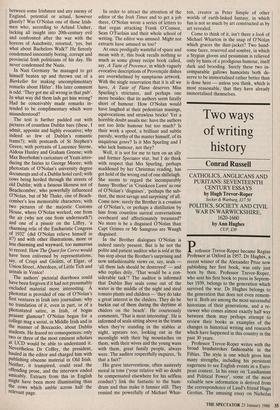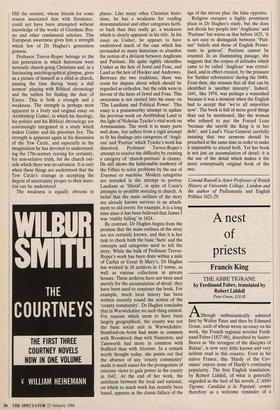Two ways of writing history
Conrad Russell
CATHOLICS, ANGLICANS AND PURITANS: SEVENTEENTH CENTURY ESSAYS by Hugh Trevor-Roper
Secker & Warburg, f17.50
POLITICS, SOCIETY AND CIVIL WAR IN WARWICKSHIRE, 1620-1660 by Ann Hughes
CUP, f30
Professor Trevor-Roper became Regius Professor at Oxford in 1957. Dr Hughes, a recent winner of the Alexander Prize now publishing her first book, was only just born by then. Professor Trevor-Roper, who sent his first book to press in Septem- ber 1939, belongs to the generation which survived the war. Dr Hughes belongs to the generation that does not even remem- ber it. Both are among the most successsful historians of their generations, and a re- viewer who comes almost exactly half way between them may perhaps attempt to review their books as examples of the changes in historical writing and research which have happened in this country in the past 30 years.
Professor Trevor-Roper writes with the broad brushstrokes fashionable in the Fifties. The style is one which gives him many strengths, including his persistent eagerness to see English events in a Euro- pean context. In his essay on `Laudianism and Political Power', some of the most valuable new information is derived from the correspondence of Laud's friend Hugo Grotius. The amusing essay on Nicholas Hill the atomist, whose friends for some reason associated him with flatulence, could not have been attempted without knowledge of the works of Giordano Bru- no and other continental scholars. This European awareness gives him a strength which few of Dr Hughes's generation possess.
Professor Trevor-Roper belongs to the last generation in which historians were normally church-going Christians and, in a fascinating autobiographical glimpse, gives us a picture of himself as a child in church, passing the time during 'many a dull sermon' playing with Biblical chronology and the tablets for finding the date of Easter. This is both a strength and a weakness.. The strength is perhaps most apparent in a lively and original essay on Archbishop Ussher, in which his theology, his politics and his Biblical chronology are convincingly integrated in a study which makes Ussher and his priorities live. The strength is apparent again in his discussion of the Tew Circle, and especially in the imagination he has devoted to understand- ing the 17th-century craving for certainty, for non-relative truth, for the church out- side which there was no salvation. It is only when these things are understood that the Tew Circle's courage in accepting the degree of uncertainty proper to their mate- rial can be understood.
The weakness is equally obvious in places. Like many other Christian histo- rians, he has a weakness for reading denominational and other categories farth- er back than they really go, a weakness which is clearly apparent in his title. In his essay on Ussher, he appears to have understood much of the case which has persuaded so many historians to abandon the notion of a division between Anglicans and Puritans. He quite rightly identifies Ussher as the heir of Jewel and Foxe, and Laud as the heir of Hooker and Andrewes. Between the two traditions, there was room for dispute about which should be regarded as orthodox, but the odds were in favour of the heirs of Jewel and Foxe. This awareness is not carried into his essay on `The Laudians and Political Power'. This essay is a praiseworthy attempt to update his previous work on Archbishop Laud in the light of Nicholas Tyacke's vital work on Arminianism. The work is in many parts well done, but suffers from a rigid attempt to fit his findings into categories of 'Angli- can' and 'Puritan' which Tyacke's work has dissolved. Professor Trevor-Roper's attempt to resolve the difficulty by creating a category of 'church-puritans' is clumsy. He still shows the fashionable tendency of the Fifties to solve problems by the use of Erasmus ex machina. Modern categories are intruded in the attempt to portray Laudians as 'liberal', in spite of Cosin's attempts to prohibit sneezing in church. A belief that the main outlines of the story are already known survives in an attach- ment to old errors: for example, it is a long time since it has been believed that James I was 'visibly failing' in 1624.
By contrast, Dr Hughes begins from the premise that the main outlines of the story are not certainly known, and that it is her task to check both the basic 'facts' and the concepts and categories used to tell the story. While the bulk of Professor Trevor- Roper's work has been done within a mile of Carfax or Great St Mary's, Dr Hughes has worked in 18 archives in 13 towns, as well as various collections in private houses. These archives have not been used merely for the accumulation of detail: they have been used to construct the book. For example, much local history has been written recently round the notion of the `county community'. Dr Hughes concludes that in Warwickshire no such thing existed. For reasons which seem to have been largely geographical, the county was not the basic social unit in Warwickshire: Stratford-on-Avon had more in common with Woodstock than with Nuneaton, and Tamworth had more in common with Stafford than with Alcester. In a remark worth thought today, she points out that the absence of any 'county community' made it much easier for the protagonists of extreme views to gain power in the county in 1642. At the end of her work, the antithesis between the local and national, on which so much work has recently been based, appears as the classic fallacy of the age of the eleven plus: the false opposite.
Religion occupies a highly prominent place in Dr Hughes's study, but she does not divide her people into 'Anglicans' and `Puritans' but warns us that before 1625, 'it is not easy to distinguish between "Puri- tan" beliefs and those of English Protes- tants in general'. Puritans cannot be counted. In an illuminating passage, she suggests that the corpus of attitudes which came to be called 'Anglican' was crystal- lised, and in effect created, by the pressure for 'further reformation' during the 1640s. Even then, she stresses that all that can be identified is 'another minority'. Indeed, 1641, like 1974, was perhaps a watershed because it was a moment when the English had to accept that 'we're all minorities now'. The book is full of more good things than can be mentioned, like the woman who refused to pay the Forced Loan `because she sayeth the King is in her debt', and Laud's Vicar-General carefully insisting that two sermons should be preached at the same time in order to make it impossible to attend both. Yet her book is not just an accumulation of detail: it is the use of the detail which makes it the more conceptually original book of the two.
Conrad Russell is Astor Professor of British History at University College, London and the author of Parliaments and English Politics 1621-29.



























































 Previous page
Previous page